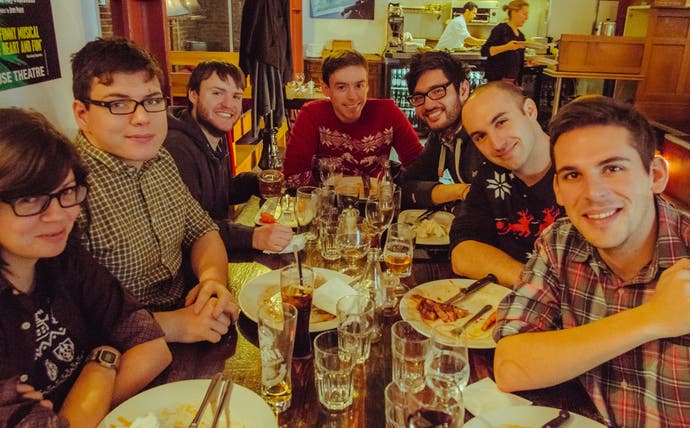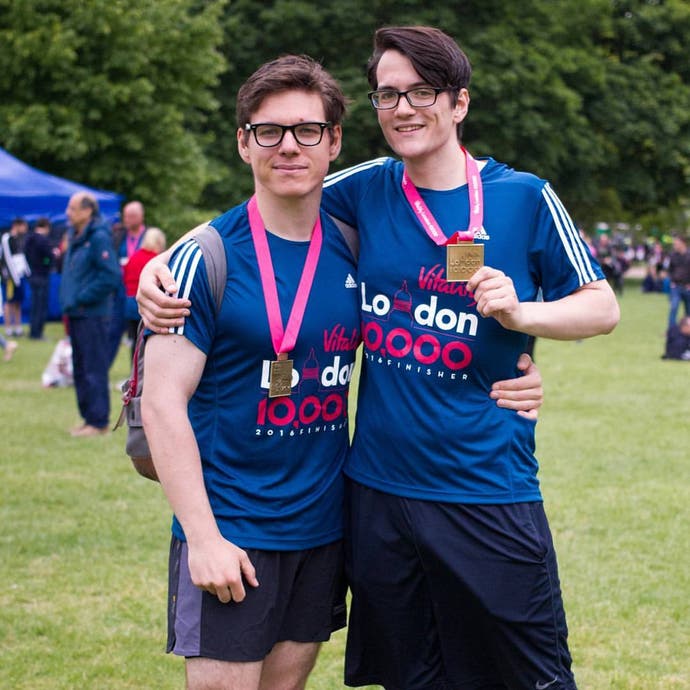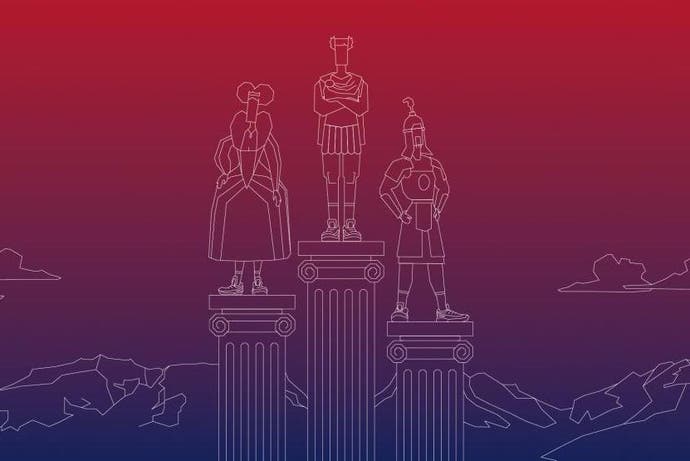Making a game out of running
Jog on.
Let's talk running. Wait, please come back. This time three years ago I bought a nice polyester T-shirt, laced up a crusty pair of trainers, started with tiny little five-minute jogs and worked up to 5K, 10K, half marathons and then the full marathon. The latter saw three of my toenails fall off and at one point was so painful it introduced me to the rare phenomenon of crying whilst moving.
I am 30, which if my friends group is anything to go by, seems to be the exact point in life us SEGA-addled kids collectively decide they definitely, absolutely must go and sign up to the London Marathon, a goal which proved even more motivating to my health than recalling the YouTube comments during my tenure as the fat one off GameSpot.

Maybe the kids who grew up with the PlayStation 2 will have a completely different generational reaction, but it doesn't surprise me that someone who spent childhood guiding a hedgehog around the world now seeks a similar sense of onward progression, although it's a crying shame Hyde Park doesn't have a loop-the-loop in sight. But I've found the objective-based structures of gaming in general translate particularly well to training for those famous distances - just a a few more speedwork sessions and you'll level up dexterity!
It's no surprise to see various developers seeking to harness all this in, you know, actual games. The most famous example here, outside of overly keen Pokemon Go players, is probably Zombies, Run!, essentially an audiobook metered out as you log mileage. There are more than a few hokey touches here, but it's a very likable story - and you've got to hand it to them for the amount of ways they narratively justify the need for you, the mute protagonist known as Runner 5, to run.
On the other end of my scale: Burn your fat with me!!, a slightly creepy 'moe' anime partner who slowly becomes more enamored with you as you get better at sit-ups. I can't tell you if the story ends with actual love, because I only bought the first chunk of the game while riding the night bus home after a heavy night and refuse to buy subsequent chapters because it's rubbish. Still, I hope there's at least one person out there who's carved out a set of Cristiano Ronaldo abs off the back of it.
Most recent to the plate is Run an Empire, which just opened a second round of crowdfunding and is looking to launch globally in 2017. Perfectly placed for the onslaught of boxfresh trainers about to grace pavements in January, here you'll be turning in mileage to 'own' real-world areas, which is sadly the closest most of us will get to the property ladder these days.
Regardless of which running game you pick up, you tend to end up in a similar place. My main haunt these days - and you'll become intimately familiar with your nearest park when you pick up running - is Tooting Bec Commons. This little patch of ragged greenery in southwest London is poorly lit, cold and unwelcoming in the winter. In the summer it's rammed full of roaming picnickers and mothers who treat their baby-stuffed prams with reckless disregard. This is my land and I, sadly, am its king.
It's easy to see the potential appeal: Strava's high-score leaderboards have been encouraging middle-aged cyclists to splat into the back of lorries for years now, so applying a similar idea (running loops both quickly and regularly) to an app makes sense. As someone who easily falls down the breadcrumb progression trail of virtually any multiplayer shooter, take it from me when I say it's all too easy to gobble up this all-you-can-eat buffet of perceived progression. Give me a whiff of a shiny bauble on a virtual trophy cabinet and I'll stay up until 3am repeating the same task endlessly for it.
Yet I find it hard to get attached here. The idea might be to gamify running, but running is surely gamified enough. Case in point: 23:47. 47:19. 1:50:54, 4:50:18. These numbers, my current personal bests for the 5k, 10k, half and full marathons, scroll through my memory like high scores from a 90s arcade cabinet. They've become my personal mental screensaver. Bettering them fuels the lacing up of trainers on a cold winter morning or bracing myself for a baking hot lunchtime lap in summer.

Your numbers might be a lot better; if you've never run a day in your life you might think they're quite impressive. Like many things I've discovered about adult life, it's a case of perspective. What's important is that they're my times, and each one is the product of a lot of work. Beating those numbers, or just maintaining them, has become the game.
Some of my niggles with Run an Empire are similarly fundamental. It basically demands you run in a circular loop, for instance, and restricts you to an hour of running at a time, hindering any acknowledgement of progressing in distance training - I wanted to use the app to train for a half-marathon but couldn't. Neither of these are a big deal until they are. I could natter on about other, basic technical failings, like the various instances it's deleted my run because it suspects I'm cheating (which I take as a compliment), or the lack of integration with Strava and Runkeeper - the totemic holy grails of the hobby - but I'd forgive a lot of that if I was more hooked by the premise.
Run an Empire doesn't complement the hobby of running, then, but running doesn't particularly enhance the mechanics behind Run an Empire's feudalistic ambition either - there's no real sense of the ownership you'd get with, say, a game of Civilization or Clash of Clans. You'd be better off separating your two hobbies, darting around the park and then coming back to give Gandhi a good kicking.
My main problem with these games is that they make you go walking, running, cycling etc. on their terms, but to me running at least has never worked that way. A lot of people tend to waffle on about a jog like it's some kind of meditative act, which is partially true; other common states are pain, hunger, and the frustration of really needing to poop when you're thirty minutes away from the nearest toilet. When I'm stuck up against a mental wall, which is something generally triggered by exertion, boredom or repetition, I have to retreat deep into my head instead of my phone.
When I think about Pokemon Go, it felt like such a summery success (and no, I don't play it any more either) because it helped people get outside and see more of the area around them, a canny little pairing of walking and the game's mechanics. Running moves in broader strokes - you tend to appreciate the breadth of the park rather than the stories behind its benches, and I don't get much extra from viewing it all in, say, hexagonal squares over a street map. I've yet to find a running game which fuses itself with the rituals and the habits it's trying to supplement, but it probably says something about me that I keep looking.
The other main argument behind most running apps is that they help promote a social scene - leaderboards, friendly competition, camaraderie and so forth. I can see that: running is as social or antisocial as you need it to be. I always do my long runs solo, but over the past couple of months I've been running in the evenings with one of my best friends - we've been training to get our 5K times back under 30 minutes after, in my instance, months of inactivity and alcoholic excess. We jog around St James' Park and catch up, talking about everything going on in our lives and slowly appreciating the week-by-week improvement, that gradual, unfolding realization that the laps of the park are coming in faster and faster. But that's not something I've ever been able to find in a leaderboard, and when it comes to times, well, that's what the races are for.
It's hard for me imagine a world where any of these running apps are the answer to why somebody is running. Running is an awful, grueling slog the narrative of our society unfairly romanticizes, but also a wonderful act which helps suppress the gremlins roaming around my mind telling me I'll never be able to do, well, anything. Running has helped turned the world into an adventure playground, my personal Green Hill Zone asking to be looped, climbed and leapt through, and that's far more interesting to me than being the ruler of any transient hexagonal kingdom.



